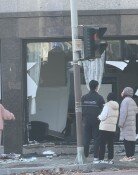War Against Piracy
When Han Jae-hyung (45) turned on his DVD player to view a DVD, which he bought during his business trip to US, he realized something went wrong.
He could not see anything due to the difference in area codes between the DVD and the player that was made in Korea. DVD area code was originally developed by major US filmmakers to protect their copyrights. By encoding DVDs differently by areas, they can prevent the circulation of a movie in an area where the film is not yet distributed due to different showing schedules.
But Mr. Han got to know that, by decoding the code of his player, he could view all DVDs from around the world. Thus, he resolved the problem through having his player decoded at a nearby electronics repair shop. Decoding which is called code-freeing took about 30 minutes and cost fifty thousand won ($42).
More and more IT companies are struggling to protect their copyrights against piracy. Companies in the digital contents and IT industries are coming up with various protective measures for their products. But the problem is that as soon as a protective measure hits the market, a countering piracy device hits the market, too.
Park Sung-joon, president of V-Secure, Inc. which is a company specializing in digital rights management, complained, We struggle to develop a device. Often, however, all we get from customers and the industry is the cold shoulder.
▽ Protection against piracy = Nowadays, it is not unusual to see the mental detectors at the blockbusters premieres held by Hollywood distributors like UIP and 20th Century Fox. It is to prevent the recording of the film by a camcorder or digital camera, which leads to illegal online circulation thereof.
For example, illegal copies of Harry Potter were found on the market just two days after it was released. In case of Star Wars Episode II, illegal copies hit the market even before the film was shown at the theater.
Recently, the US Federal Communications Committee has decided to mandate the installation of a device by 2007 into TV sets 36 or more. The device will block reception of digital broadcasting and make it impossible to make illegal copies. Accordingly, in the future, it would be impossible to record or store a TV program into a computer at home.
As piracy through high-speed Internet service and devices using cutting-edged technology are getting widespread, companies in the digital contents and telecommunication industries are aggressively adopting protective measures.
▽ Sonys Solution = Software piracy has plagued Sony, which has sold more than 3,000 units of home game player Play Station 2 (PS2). Sony designed PS2 as a storing device, hoping, that way, it could decrease illegal copying. But the hope just ended up as a hope. As the cost for copying onto DVDs has got cheaper, however, illegal copying has shot up. A copied DVD for PS2 domestically in circulation just costs 20,000 won (approximately $24), a lot cheaper than 50,000 won for a certified copy. In addition, a modification chip which is required to run the illegal copies costs 50 to 160 thousand won for installation. Legal Division Chief of Sony Computer Entertainment Korea Kim Sung-hyun confirmed, 9 out of 10 retail stores, excluding the convenient stores, sell illegally copied software.
In response, Sony has recently come up with an encoding technology called Open MG X. Using that technology, it can set the running hours and number of running. Sony plans to make this technology as a worldwide standard by first applying this to its own products such as PS2s, camcorders, digital audio sets and palm-tops.
▽ Pierce War Between Offense and Defense = Makers of DVD players regionally encode their products according to the International Convention. But most of the players sold at big malls such as Yong-san Electronics Mall and TechnoMarts are treated with code-freeing in advance.
Samsungs Chief Researcher Kim Young-han in charge of DVD development said, Its almost impossible to root out code-freeing. Once a new product hits the market, a new way of code-freeing gets available.
Hollywood filmmakers developed a strengthened area code name RCE against code-freeing. But a new way of decoding RCE nullified filmmakers intention. Since it is hard to boost sales volume with code-freeing resistant products, manufacturers themselves are not enthusiastic about it. Even some Chinese companies produce their products without area-coding devices, causing a dispute with Hollywood filmmakers.
In the meanwhile, the macro-vision signal is supposed to block illegal copying once the signal is put into the visual contents of a commercial film using media such as videotapes and DVD. But, by just installing a device worth 100,000 200,000 won, a person can easily eliminate the signal. Furthermore, Microsoft marketed a certification function, under which an illegal copy of Windows XP or Office XP cannot be used more than 30 days. But it also has not achieved its goal. Now everyone can obtain rip versions on the Internet, which can nullify the function.
Professor of Law Bang Suk-ho at Hong Ik University said, More and more disputes will develop between companies holding copyrights and users as more and more people use digital contents.
Tae-Han Kim freewill@donga.com changkim@donga.com




![[김순덕의 도발] ‘李부터 연임’ 개헌, 이 대통령은 가능성을 말했다](https://dimg.donga.com/c/138/175/90/1/wps/NEWS/IMAGE/2026/01/16/133172656.1.jpg)


